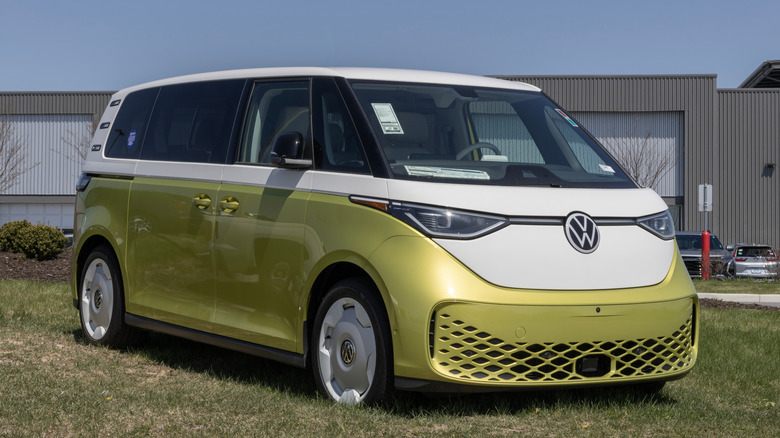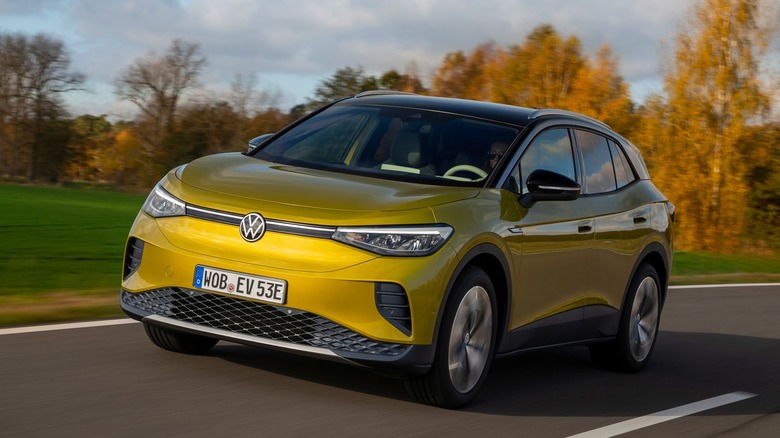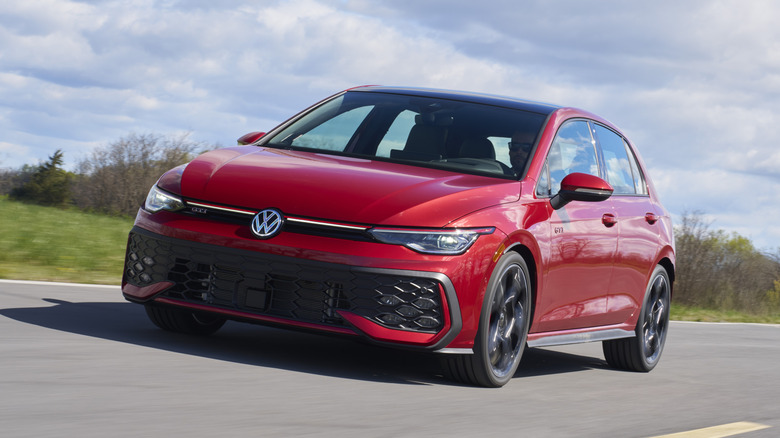You can’t get the Volkswagen GTI with a manual transmission anymore, but following its latest refresh, it does now come with actual buttons on the steering wheel again. So that’s nice. I shouldn’t be too mean, though, because the dual-clutch transmission is great, and the car itself really is an excellent hot hatch. You can also expect to see continued improvements over the next several years before the GTI inevitably goes electric. When that eventually happens, though, it will still be front-wheel drive, AutoExpress reports. And I would argue that’s a mistake.
That information reportedly comes directly from current Volkswagen CEO Thomas Schäfer, who also implied the new GTI will show up around 2029 and offer some serious performance, telling AutoExpress, “At the end of the decade we will bring an electric Golf [GTI], and that will be a monster car.” That sounds fun, especially when paired with his promise that it will be “exciting” to drive and AutoExpress’s claim the electric GTI will most likely match the ID.3 GTX‘s 322 horsepower rating. The GTI just won’t get the ID.3 GTX’s rear-wheel drive, which is a shame.
As a Fiat 500e owner I’m no stranger to front-wheel-drive electric hatchbacks, and it’s understandable that you’d assume someone who’s still annoyed Volkswagen dropped the GTI’s manual transmission (even though roughly half of GTI/R sales in the U.S. were manuals back when that was an option) would want Volkswagen to at least stick with front-wheel drive when it makes the GTI electric. My question to you, though, is why should the electric GTI stick with front-wheel drive?
No longer saving money
Front-wheel drive only got popular on gas-powered cars because it was cheaper than rear-wheel drive. It made sense to make the Golf front-wheel drive because it was supposed to be an affordable daily driver, and the same held true for the GTI. If Volkswagen had made the GTI rear-wheel drive, the value proposition would have gone out the window. And while it’s easy to look down on front-wheel drive as a teenage enthusiast who hasn’t driven anything yet, spend a few minutes behind the wheel of basically any GTI, and tell me it isn’t fun. You can’t.
With an electric hot hatch, though, Volkswagen won’t see the same cost savings from keeping front-wheel drive. At that point, all it’s doing is sacrificing driving dynamics for the sake of tradition. Volkswagen knows that, too, because it wasn’t that long ago that it announced all future electric vehicles would be either rear or all-wheel drive. As Matthew Renna, Volkswagen’s then-North American head of E-Mobility, told me back in 2018 when I still worked for MotorTrend:
“Well, you get some benefits on an internal combustion engine [vehicle] from doing a front-engine, front-wheel-drive [layout] because you don’t need the driveshafts and rear axles and all that,” Renna explained. “With an electric vehicle, you have a drive unit and some cables, so you can package that drive unit in the front if you want a front-wheel-drive car. And that would be efficient, but you’re equally as efficient with that same motor in the rear, save a few pennies of copper to lengthen the cable. So, you know, with the improved dynamics of rear-wheel drive, that lends itself to being a bit better for a rear-drive platform given the fact that it’s roughly cost-neutral. “
A FWD e-GTI doesn’t make sense
At that same roundtable, Christian Buhlmann, Volkswagen’s then-head of product line communications, went a step further, claiming front-wheel drive is inherently inferior in EVs due to their torquey nature and the physics of acceleration. In fact, he even went as far as to say a front-wheel-drive EV “doesn’t make sense.” As Buhlmann put it back in 2018:
“It doesn’t make much sense because if you think of the starting torque that you have and the dynamic weight distribution, the weight is lifted from the front axle towards the rear axle,” he said. “That’s exactly where you need the torque to be in your acceleration moment. Therefore, it physically doesn’t make sense to use only the front axle if you have the vehicle that offers a lot of torque right from the start.”
That isn’t exactly a controversial statement, and I can’t imagine any engineers would disagree, but nevertheless, here we are in 2025, and Volkswagen has decided the electric GTI will be an inferior driver’s car, presumably for the sake of tradition. But why? It’s already going electric, getting a relatively heavy battery and forgoing the manual transmission. Why stick to that one particular tradition? Just because?
I guess you could argue some people genuinely prefer the way a front-wheel-drive car handles, but I’d be willing to bet the vast majority of those people will also be mad the GTI went electric. If that particular subset of enthusiasts will already be upset, why not swap the motor to the rear and make sure the upcoming e-GTI is the best-driving electric hot hatch possible? If anything is going to win those people over, it’ll be a car that’s so undeniably good to drive, they can’t stay mad.
Volkswagen still has time
Additionally, it isn’t like Volkswagen would have to do any additional work to make the electric GTI rear-wheel drive. In the same AutoExpress interview, Schäfer also confirmed an electric Golf R is coming, too, and will still be all-wheel drive. So, right out of the gate, the design brief already includes a rear motor. You just won’t be able to get it in the GTI unless you buy a Golf R, rip out the front motor and rebadge it as a GTI. That’s 100% a decision from the top, not a decision influenced by cost or packaging.
The good news is, since Volkswagen’s engineers are already doing all the necessary work years before anyone outside the company gets to drive the e-GTI, changing course is also as simple as someone at the top having the courage to say, “Actually, let’s stick the GTI’s motor at the back.” It doesn’t come without risk, either. The people least likely to buy a new car are often the loudest, and the board could easily get spooked and can the CEO who decided the GTI should go rear-wheel drive. I get that.
But the traditionalists are already going to be upset Volkswagen’s making the GTI electric. It also stands to reason that other automakers also buy Renna and Buhlmann’s arguments and will offer rear-wheel-drive hot hatches of their own. So, not only will the current plan for the e-GTI ensure it doesn’t drive as well as it could, it also means it may not be as competitive as it needs to be when it finally goes on sale in 2029 or 2030.
Maybe I’m wrong, and buyers really will flock to the electric GTI because of its front-wheel-drive powertrain. Anything is possible. But from where I’m standing, it makes far more sense to make the next-generation GTI rear-wheel drive, and failing to do so will eventually be viewed as a mistake.






